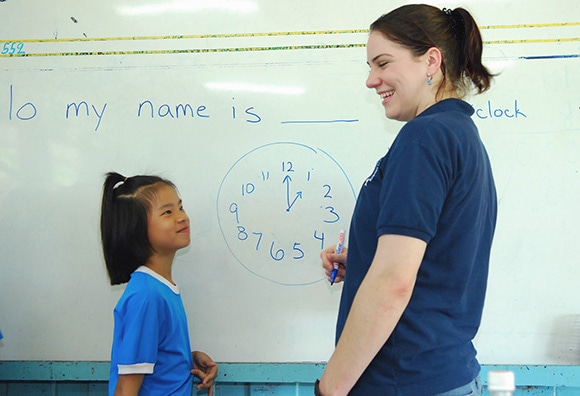The Kaleidoscope of Expat Teachers
Written by Dr. David E. Shaffer
The expat English teacher has become a prevalent fixture on the Korean education scene, and like socks, they come in many different styles and for many different purposes. There are many different reasons for the expat native English speaker to come to Korea and take up a teaching position – some more altruistic than others, some more self-centered than others. While recognizing that each individual is different, this article takes a look at a number of quintessential types of expat English teachers, their strengths, and their vulnerabilities in the hope that with a bit of self-reflection we will be able to improve upon our roles as teachers.
THE ALTRUISTIC TEACHER
Having the desire to help others less fortunate than oneself is a very selfless aspiration. It was the calling of some of the North American Christian missionaries who came to Korea in the 1900s to teach English as part of their mission. It was the ideal of members of the U.S. peace movement of the 1960s, and quite a few of these idealists, in answering the call to service, signed up for the Peace Corps to teach English in Korea. While their intentions were to be commended, there was very little ELT support available for them at the time. If today’s methods had been known to them and if today’s materials and technology had been available to them, I am sure that they would have been English teachers par excellence. They did, however, fill a need; it is not uncommon to hear an older Korean today say that they were thankful to have had a Peace Corps member as their middle school English teacher. But the age of the altruist is waning; Most expat teachers in Korea today have a more practical or personal reason for being here.
THE “I LIKE TEACHING” TEACHER
Some people are just born teachers. For them imparting knowledge and skills to others and watching them develop is most gratifying. The native English speaker who likes teaching may have majored in TESL (teaching English as a second language) in college in the hopes of following a career in this field but finds job opportunities too limited in their home country. They may consider teaching abroad for a period of time and end up teaching English in Korea. They may also find that their degree did not fully prepare them for teaching in a different culture with a different educational system and a different language. Programs such as EPIK realize this and organize training sessions for their members. A group such as Korea TESOL – a group of “teachers helping teachers” – could also be of help to them, and even more so for those not associated with an EPIK-like program. College graduates finding a TESL job in Korea but having a degree less closely related to ELT (English language teaching), such as education or communications, should seriously consider an online TESL certificate program in addition to seeking out a teachers group such as Korea TESOL.
THE “I LIKE KIDS” TEACHER
Some people just like working with kids and are good at it. It may well be that this type of native English speaker (NES) also finds an English teaching job in Korea more readily available than a job working with children or teens in their home country. While such a NES teacher may be able to work well with Korean students, they are quite likely to find their teaching skills lacking if they did not receive prior training in TESL. This could easily result in the students not being able to reach their language learning potential and in their school supervisors and their students’ parents being less than satisfied with the teacher’s performance. For this type of NES teacher, too, an online TESL certificate program as well as Korea TESOL could be of great help. There are now numerous quality TESL certificate programs available online at reasonable prices.

THE SELF-CENTERED TEACHER
In addition to the NES teachers who are teaching English in Korea because of their love of teaching or working with young people, there are others who are here for quite different reasons. Because the demand for native English-speaking English teachers in Korea is considerably greater than the supply of NESs with English teaching training, the requirements for English teaching positions in some areas of the industry are quite limited. Accordingly, it becomes relatively easy to land a teaching position in some language schools for NESs whose main concern is something other than teaching English.
There is the “world traveler,” who travels, stops to make some money for additional travel, and continues the cycle. A teaching gig in Korea fits well into their travel plans. There is the college graduate who, fresh out of college, may have considerable college loans to pay off. A teaching job in Korea may be seen as the quickest path to employment to begin paying down their debt. And there are those NESs who wish to live in Korea for an extended period of time for numerous other reasons (e.g., to do research for a book they wish to write, to study taekwondo, to live in their spouse’s home country). For these individuals, too, English teaching positions may be the easiest for them to get to support themselves.
Everyone needs a means of support for themselves and possibly for their family also. English teaching is the most available option for many NESs. However, when one is in a teaching position – a situation in which their performance on the job directly impacts the lives of others – that person must be at least as concerned about their students as they are about themselves. It is incumbent upon them to seek out the necessary training that English teaching in Korea requires.
As mentioned above, completing an online TESL certificate program is one option. Asking a colleague for advice or mentorship is another. And seeking out the teachers-helping-teachers assistance that Korea TESOL can provide is yet another. What every English language teacher must do, NES expat or not, is to take some time for some sincere self-reflection on the teaching job they are performing and determine how they can best improve their teaching skills to best serve their clients – the English language learners in their charge.
The Author
David E. Shaffer is vice-president of the Gwangju-Jeonnam Chapter of Korea TESOL (KOTESOL). On behalf of the chapter, he invites you to participate in their teacher development workshops at their monthly meetings (always on a Saturday). For many years, Dr. Shaffer has been a professor of English Language at Chosun University. He is a long-time member of KOTESOL and a holder of various KOTESOL positions; at present he is national president. Dr. Shaffer credits KOTESOL for much of his professional development in English language teaching, scholarship, and leadership. He is board chair at the GIC and also editor-in-chief of the Gwangju News.





